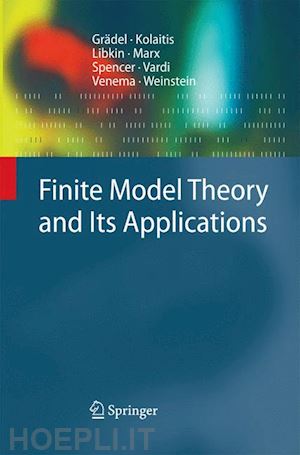
Questo prodotto usufruisce delle SPEDIZIONI GRATIS
selezionando l'opzione Corriere Veloce in fase di ordine.
Pagabile anche con Carta della cultura giovani e del merito, 18App Bonus Cultura e Carta del Docente
Erich Graedel is a Professor of Mathematical Foundations of Computer Science at the University of Technology Aachen. His research interests include algorithms, complexity, and logic in computer science.
Phokion G. Kolaitis is a professor of computer science at the University of California, Santa Cruz. His current research interests include logic in computer science, computational complexity, and database theory. He earned a Diploma in Mathematics from the University of Athens, Greece in 1973, and a Ph.D. in Mathematics from the University of California, Los Angeles in 1978. Before joining UC Santa Cruz in 1988, he served as an L.E. Dickson Instructor of Mathematics at the University of Chicago, a faculty member at Occidental College, a visiting faculty member at Stanford University, and a visiting scientist at the IBM Almaden Research Center. Kolaitis was awarded a Guggenheim Fellowship during 1993-94. In 1995, he received an Excellence in Teaching Award by the graduating computer science and computer engineering students at UC Santa Cruz.
Leonid Libkin received his PhD from the University of Pennsylvania and is currently Professor of Computer Science at the University of Toronto. His main research interests include databases and applications of logic in computer science.
Maarten Marx is an associate professor at the Vrije Universiteit Amsterdam. His research interests are in modal and algebraic logic.
Joel Spencer is a Professor of Mathematics and Computer Scienceat the Courant Institute, New York University. His research interests lie in interface between Discrete Mathematics and Theoretical Computer Science, most particularly with the Probabilistic Method as developed by Paul Erdos.
Moshe Y. Vardi is a Noah Harding Professor of Computer Science and Chair of Computer Science at Rice University. Prior to joining Rice in 1993, he was at the IBM Almaden Research Center, where he managed the Mathematics and Related Computer Science Department. His research interests include database systems, computational-complexity theory, multi-agent systems, and design specification and verification. Vardi received his Ph.D. from the Hebrew University of Jerusalem in 1981. He is the author and co-author of over 120 technical papers, as well as a book titled "Reasoning about Knowledge". Vardi is the recipient of 3 IBM Outstanding Innovation Awards. He is an editor of several international journals and is a Fellow of the Association of Computing Machinery.
Yde Venema studied mathematics; in 1992, he received a PhD in Logic with the dissertation `Many-Dimensional Modal Logic'. He is currently a Research Fellow of the Royal Netherlands Academy of Arts and Sciences and an assistant professor at the Institute for Logic, Language and Computation of the University of Amsterdam. His research interests include modal and temporal logic, algebraic logic, and applications of logic in linguistics and computer science.
Scott Weinstein is Professor of Computer Science, Mathematics, and Philosophy at the University of Pennsylvania. His research interests include logic in computer science and the philosphy of mathematics.











Il sito utilizza cookie ed altri strumenti di tracciamento che raccolgono informazioni dal dispositivo dell’utente. Oltre ai cookie tecnici ed analitici aggregati, strettamente necessari per il funzionamento di questo sito web, previo consenso dell’utente possono essere installati cookie di profilazione e marketing e cookie dei social media. Cliccando su “Accetto tutti i cookie” saranno attivate tutte le categorie di cookie. Per accettare solo deterninate categorie di cookie, cliccare invece su “Impostazioni cookie”. Chiudendo il banner o continuando a navigare saranno installati solo cookie tecnici. Per maggiori dettagli, consultare la Cookie Policy.